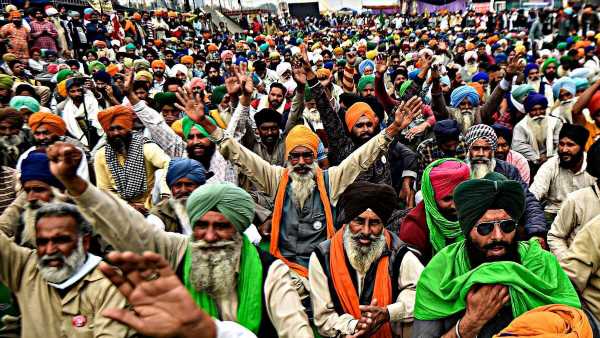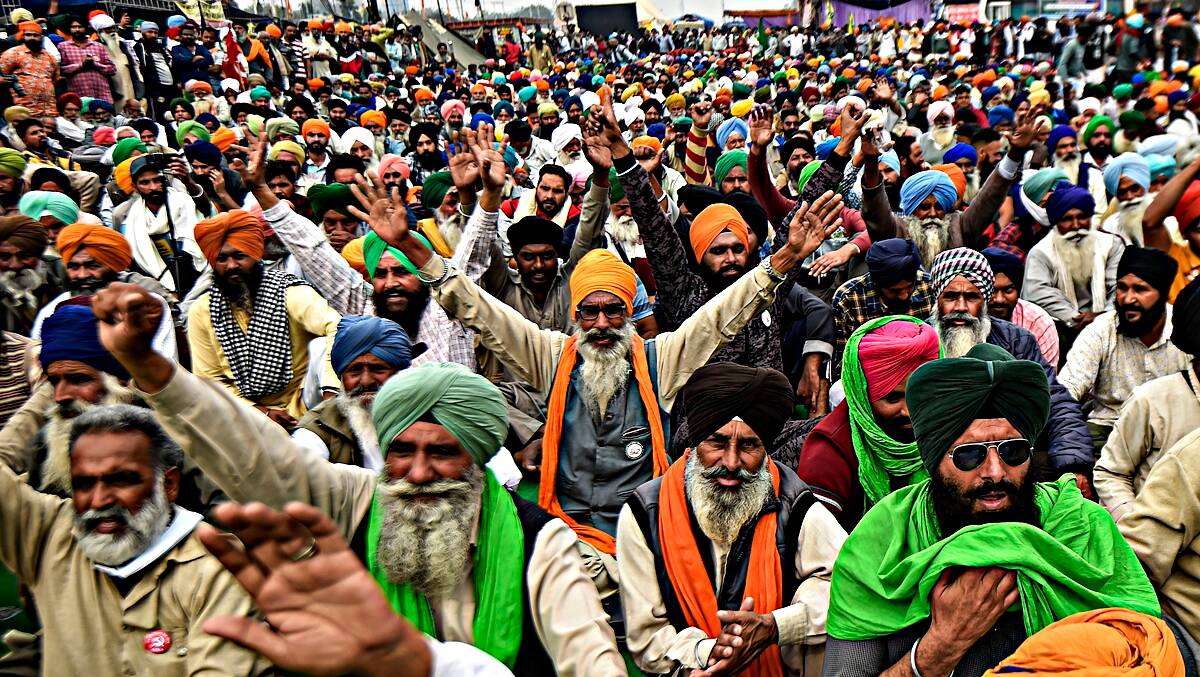The protests began on November 25 last year, when thousands of farmers marched towards the national capital demanding a complete repeal of the legislation, as part of a “Dilli Chalo” campaign.
Prime Minister Narendra Modi on Friday announced to repeal the three contentious agriculture laws that were enacted on September 17, 2020. Following the enactment, protests by farmers from across the nation — mainly from Punjab and Haryana — have been ongoing on the borders of the national capital and in different parts of North India.
PM Modi also appealed to the farmers to call off their agitation and return home.
The three laws are the Farmers’ Produce Trade and Commerce (Promotion and Facilitation) Act, 2020; Essential Commodities (Amendment) Act, 2020; and Farmers (Empowerment and Protection) Agreement on Price Assurance and Farm Services Act, 2020. The farmers feared the laws will lead to the abolishment of the minimum support price (MSP) guaranteed by the government on select crops, and leave them at the mercy of big corporations.
Here’s a timeline of the farmers’ protest since the new laws were introduced:
The protests began on November 25 last year, when thousands of farmers marched towards the national capital demanding a complete repeal of the legislation, as part of a “Dilli Chalo” campaign.
June 5, 2020: The Centre promulgates three Farm Bills. These three Bills push the agricultural sector in India from a Government-run to a private-run sector.
September 14, 2020: Ordinance is brought to Parliament.
September 17, 2020: Ordinance is passed in Lok Sabha.
September 20, 2020: Ordinance is passed in Rajya Sabha by voice vote.
September 24, 2020: Farmers in Punjab announce a three-day rail roko.
September 25, 2020: Farmers across India take to the streets in response to a call by the All India Kisan Sangharsh Coordination Committee (AIKSCC).
September 27, 2020: Farm Bills are given presidential assent and notified in the Gazette of India and become Farm Laws.
November 25, 2020: After sporadic protests against the new farm laws, including a nationwide road blockade on November 3, farmers’ unions in Punjab and Haryana gave the call for a ‘Delhi Chalo’ movement. The Delhi Police, however, rejected their request to march to the capital city citing Covid-19 protocols.
November 26, 2020: Farmers marching towards Delhi faced water cannons, tear gas as the police tried to disperse them at Haryana’s Ambala district. Later, police allowed them to enter Delhi for their peaceful protest at Nirankari ground in North-West Delhi.
November 28, 2020: Home Minister Amit Shah offered to hold talks with farmers as soon as they vacate Delhi borders and move to the designated protest site in Burari. However, farmers rejected his offer, demanding to hold the protest at Jantar Mantar.
December 3, 2020: The government held first round of talks with representatives of farmers but the meeting remained inconclusive.
December 5, 2020: The second round of talks between farmers and the Centre also remained inconclusive.
December 8, 2020: Farmers gave a call for Bharat Bandh. Farmers from other states also gave their support to the call.
December 9, 2020: Farmer leaders rejected the Union government’s proposal to amend the three contentious laws and vowed to further intensify their agitation until the laws are repealed.
December 11, 2020: Bharatiya Kisan Union moved the Supreme Court against the three farm laws.
December 13, 2020: Union Minister Ravi Shankar Prasad alleged hand of ‘tukde tukde’ gang in farmer protests and said the government was open to talks with farmers.
December 21, 2020: Farmers held a one-day hunger strike at all protest sites.
December 30, 2020: Sixth round of talks between government and farmer leaders saw some headway as the Centre agreed to exempt farmers from stubble burning penalty and drop changes in Electricity Amendment Bill, 2020.
January 4, 2021: Seventh round of talks between government and farmer leaders also remained inconclusive with the Centre not agreeing to repeal the farm laws.
January 7, 2021: The Supreme Court agreed to hear petitions challenging the new laws and those against the protests on January 11. This comes even as Attorney General K K Venugopal told the court that talks between farmers and the Centre “may just work”.
January 11, 2021: The Supreme Court rapped the Centre for its handling of the farmers’ protest. The top court said it would constitute a committee headed by a former Chief Justice of India to resolve the deadlock.
January 12, 2021: The Supreme Court stayed the implementation of the three contentious farm laws and set up a four-member committee to make recommendations on the legislations after listening to all stakeholders.
January 26, 2021: On Republic day, thousands of protestors clashed with the police during the tractor parade called by farmer unions on January 26, demanding a repeal of the laws.
After several protestors from Singhu and Ghazipur changed their route, they marched towards Central Delhi’s ITO and Red Fort, where police resorted to teargas shelling and lathi charge while some farmers vandalised public property and attacked police personnel. At Red Fort, a section of protesters climbed poles and walls and hoisted the Nishan Sahib flag. One protester died in the chaos.
January 28, 2021: Tensions rose at Delhi’s Ghazipur border after the administration in neighbouring UP’s Ghaziabad district issued orders for protesting farmers to vacate the site by night. By evening, as police in anti-riot gear started spreading out at the site, the protesters camped there and their leaders, including BKU’s Rakesh Tikait, said they would not leave.
February 5, 2021: The cyber-crime cell of the Delhi Police has registered an FIR on charges of “sedition”, “criminal conspiracy” and “promoting hatred” against the creators of a ‘toolkit’ on farmer protests, which was shared by Thunberg. The 18-year-old deleted the original tweet on Wednesday but tweeted a revised toolkit on Wednesday night.
February 6, 2021: Protesting farmers held a nationwide ‘Chakka Jam’, or road blockade, for three hours from 12 noon to 3 pm. While several roads across Punjab and Haryana were blocked during that time, elsewhere the ‘chakka jam’ protest evoked a scattered response.
February 9, 2021: Punjabi actor-turned-activist Deep Sindhu, named an accused in the Republic Day violence case, was arrested by Delhi Police Special Cell on Tuesday morning. He was sent to 7-day police custody later in the evening.
February 18, 2021: Samyukta Kisan Morcha (SKM), the umbrella body of farmer unions spearheading the agitations last week, called for a nationwide ‘rail roko’ protest. Trains were stopped, cancelled and rerouted in places around the country.
March 02, 2021: Shiromani Akali Dal chief Sukhbir Singh Badal and other party leaders were detained by the Chandigarh Police from Sector 25 as they tried to march towards the Punjab Vidhan Sabha to gherao it on Monday afternoon.
March 05, 2021: The Punjab Vidhan Sabha passed a resolution asking for the unconditional withdrawal of the farm laws in the interest of the farmers and Punjab, and to continue with the existing system of MSP-based government procurement of foodgrains.
March 06, 2021: Farmers complete 100 days at Delhi’s borders.
April 15, 2021: Haryana Deputy Chief Minister Dushyant Chautala writes to Prime Minister Narendra Modi urging him to resume talks with farmers who are protesting at Delhi’s borders, and reach an “amicable conclusion” to the impasse over the farm laws.
April 26, 2021: Deep Sidhu gets second bail.
May 27, 2021: Farmers observed a ‘black day’to mark six months of the agitation, and burned effigies of the government. Though the crowds at the three borders thinned, farm leaders had said that agitation will continue till 2024 if their demands were not met. Bharatiya Kisan Union leader Rakesh Tikait, during a press conference, also reiterated that farmers will call off the protest only once the three farm laws were repealed.
June 5, 2021: Protesting farmers observe Sampoorn Krantikari Diwas (total revolution day) to mark the first year of the promulgation of the Farm Laws.
June 26, 2021: Farmers march to Delhi to mark seven months of protest against the farm laws. Samyukta Kisan Morcha (SKM) claimed that farmers were detained in states like Haryana, Punjab, Karnataka, Uttarakhand, Madhya Pradesh and Telangana during the protests.
July 2021: About 200 protesting farmers started a parallel “Monsoon Session”, Kisan Sansad, near the Parliament House here on Thursday, condemning the three farm laws. Members of Opposition parties staged protests in front of the Mahatma Gandhi statue inside the House complex.
August 7, 2021: Leaders of 14 opposition parties met at Parliament House and decided to visit Kisan Sansad at Delhi’s Jantar Mantar, where a select group of farmer leaders have been holding a Kisan Sansad (farmers’ parliament) since July 22 to mark seven months of the protests at Delhi’s border points against the laws. Gandhi and the other leaders reiterated that the three controversial laws should be withdrawn.
August 28, 2021: The agitation against farm laws enacted last year returned to the spotlight when Haryana Police cracked down on farmers in Karnal, leaving several injured in a lathicharge at the Bastara toll plaza on the national highway.
September 7 – 9, 2021: Farmers reach Karnal in large numbers and laid siege to the mini-Secretariat. The farmers put forth three primary demands including Rs 25 lakh compensation to the family of Kajal and a government job for his relative, compensation of Rs 2 lakh each for those injured in the lathicharge and registration of a criminal case and stern action against Karnal SDM Ayush Sinha and police personnel responsible for the lathicharge.
September 11, 2021: Bringing to an end the five-day standoff between farmers and the Karnal district administration, the Haryana government agreed to conduct a probe by a retired judge of the Punjab and Haryana High Court into the August 28 police lathicharge on farmers at the Bastara toll plaza, and send former Karnal SDM Ayush Sinha on leave till completion of the inquiry.
October 22, 2021: The Supreme Court observed that it was not against people’s right to protest even on matters that are sub judice, but made it clear that such protesters cannot block public roads indefinitely. The bench was hearing a plea by Noida resident Monicca Agarwaal who highlighted problems faced by commuters on account of the ongoing protests against the farm laws, and sought the protesters’ removal from the Delhi border.
October 29, 2021: The Delhi Police started removing barricades from the Ghazipur border where farmers have been protesting against the Centre’s three new agriculture laws. Similar scenes were also seen at the Tikri border. Police officials and labourers were also seen removing iron nails that were studded on the NH9 at Ghazipur.
Before PM Modi’s announcement for repealing the farm bills today, the Samyukta Kisan Morcha has called for 500 farmers to will participate in a peaceful tractor march to Parliament every day during Winter Session starting November 29. This will be done to mark one year of the agitation against the Centre’s three agriulture laws.
The SKM had also called for massive mahapanchayats in all state capitals on November 26 as part of the first anniversary of the agitation at Delhi borders. That day, the farmers from Punjab, Haryana, Uttar Pradesh, Uttarakhand and Rajasthan will gather at the borders of Delhi to participate in the mahapanchayats.
Source: Read Full Article


